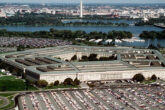March 01, 2018
Space Exploration Could Be the Key to America’s Renewal
History is replete with examples of great nations sliding slowly into decline. Six hundred years ago, Ming Dynasty China sent Admiral Zheng He on seven voyages throughout the western Pacific and Indian Ocean to explore, collect tribute, and expand trade. Zheng’s ships were massive and state-of-the-art: 400 feet long, 170 feet wide, powered by nine masts. His voyages were a huge success. But after his death, subsequent generations sought to minimize his accomplishments. China’s focus turned inward, its energy was expended on building the Great Wall, and it started to decline. Great nations do great things, but when they stop challenging themselves, their greatness tends to recede into historical memory.
Nearly 60 years ago, the United States took up a great challenge. Its young president, John F. Kennedy, stated, “I believe that this Nation should commit itself to achieving the goal, before this decade is out, of landing a man on the Moon and returning him safely to Earth.” Kennedy’s tragic death a few years later galvanized the nation in its pursuit of his goal, and on July 20, 1969, Neil Armstrong made his famous “small step.” All told, the United States sent nine expeditions to the moon, six landing on its surface, each traveling on massive 363-feet-tall, three-stage, Saturn V rockets that were modern marvels. Then, as Americans stood on the surface of the moon, their government decided to cancel the final three lunar missions, Apollos 18, 19, and 20, in order to shift NASA’s focus to the earth-orbiting Skylab space station and then to the Space Shuttle. For the past 45 years, the United States has been effectively locked in low-Earth orbit and does not presently even have the capability to launch its own astronauts into space. Great nations do great things, until they don’t and cease to be great.
Read the full article in The National Review.
More from CNAS
-
The Department of Defense’s Breakthrough Nuclear Moment Risks Slipping Away
Unless they act, the Department of Defense’s breakthrough nuclear moment may vanish before it really happens....
By Will Rogers
-
DEFAERO Strategy Series [Apr 09, 25] CNAS' Becca Wasser and Phil Sheers on Revitalizing the U.S. Defense Industrial Base
On this episode of the Defense & Aerospace Report Strategy Series, sponsored by General Atomics Aeronautical Systems, Becca Wasser and Phil Sheers of the Center for a New Amer...
By Becca Wasser & Philip Sheers
-
From Production Lines to Front Lines
Executive Summary The U.S. defense industrial base (DIB) is struggling to meet the demands of the current strategic environment—let alone prepare for a potential conflict agai...
By Becca Wasser & Philip Sheers
-
The Pentagon’s Endangered Brain Trust
In this environment, sound assessments of emerging threats and new ideas to counter them will be especially vital....
By Dr. Andrew Krepinevich, Jr.




